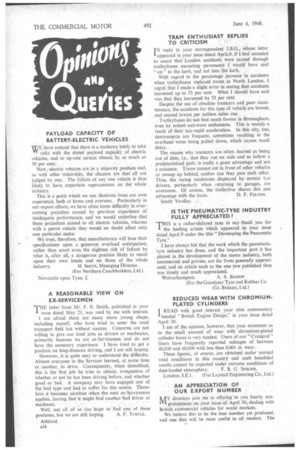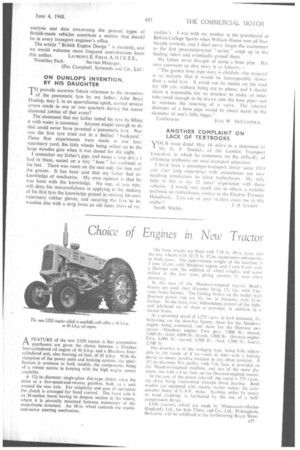PAYLOAD CAPACITY OF BATTERY-ELECTRIC VEHICLES WE have noticed that there
Page 48

Page 51

If you've noticed an error in this article please click here to report it so we can fix it.
is a tendency lately to take " risks with the stated payload capacity of electric vehicles, and to up-rate certain chassis by as much as 50 per cent. .
Now, electric vehicles are in a minority position and, as with other 'minorities, the chances are that all are judged by one. The failure of any one Vehicle is thus' likely to have important repercussions on the whole industry. .
This is a point which we can illustrate from our own
experience, both at home and overseas. Particularly in our export efforts, we have often some difficulty in overcoming prejudice caused by previous experience of inadequate performance, and we would underline .that these prejudices extend to all electric vehicles, whereas with a petrol vehicle they would no doubt affect onlyone particular make.
We trust, therefore, that manufacturers will base their specifications upon• a generous overload -anticipation, rather than court even the slightest risk of failure by what is after all, a dangerous practice likelyto recoil upon their own beads and on those of the whole
industry. . M. SMITH, Managing Director.
(For Northern Coachbuilders, Ltd.) Newcastle upon Tyne, 2.
A REASONABLE VIEW ON EX-SERVICEMEN THE letter from Mr. F. E.,. Smith, published in your issue dated May 21, was read by me with interest. 1 am afraid there are many more young chaps, including myself, who have tried to enter the road transport field but without success. Concerns are not willing to give our kind jobs as drivers or mechanics, primarily because we are ex-Servicemen and do not have the necessary experience. I have tried to get a position on long-distance driving, and I am still hoping.
However, it is quite easy to understand the difficulty. Almost everyone in the Services learned, at some time or another, to drive. Consequently, when demobbed, this is the first job he tries to obtain, irrespective of whether or not he has been driving before, and whether good or bad. A company may have engaged one of the"bad type and had to suffer for this action. Therefore it becomes cautious when the next ex-Serviceman applies, fearing that it might find another bad driver or mechanic. ' • Well, not all of us Can hope to find one of these.
positions, but we are still hoping. A. F. TURTLE. Ashford.
k34 TRAM ENTHUSIAST REPLIES TO CRITICISM IN reply to your correspondent J.B.G., whose letter I appeared in your issue dated Apri1.9, if I had intended
to assert that London accidents were caused through trolleybuses mounting pavements I would have said " on " to the kerb, and not into the kerb.
With regard to the percentage increase in accidents when trolleybuses replaced trams in North London, I regret that I made a slight error in stating that accidents increased up to 53 per cent. What I should have said was that they increased by 53 per cent.
Despite the use of obsolete tramcars and poor maintenance, the accidents for this type of vehicle are lowest, and second lowest per million miles run.
Trolleybuses do not find much favour in Birmingham, even by ardent anti-tram enthusiasts. This is mainly a result of their too-rapid acceleration. In this city, too, dewirements are frequent, sometimes resulting in the overhead wires being pulled down, which causes much delay.
The reason why tramcars are often decried as being out of date, i.e., that they run on rails and so follow a predetermined path, is really a great advantage and not a nuisance. Trams cannot cut in front of other vehicles or swoop up behind, neither can they pass each other. Thus, the racing tendencies displayed by certain bas drivers, particularly when returning to garages, are overcome. Of course, the trolleybus shares this one
advantage with the tram. D. F. FELTON. South Yardley.
IS THE PNEUMATIC-TYRE INDUSTRY FULLY APPRECIATED?
THIS is a rather-delayed note to say thank you for 1 the leading article which appeared in your issue dated April 9 under the title "Developing the Pneumatic Tyre."
I have always felt that the work which the pneumatic tyre industry has done, and the important part it has played in the development of the motor industry, both commercial and private, are far from generally appreciated, and an article such as the one you published then was timely and much appreciated.
Wolverhampton. A. S. BISHOP.
(For theGoodyear Tyre and Rubber Co. (Gt. Britain), Ltd.) REDUCED WEAR WITH CHROMIUM. PLATED CYLINDERS I READ with great interest your able commentary I headed 'British Engine Design," in your issue dated April 30.
I am of the opinion, however, that your statement as to the small amount of wear with chromium-plated cylinder bores is very modest. Users of our " Cromard " liners have frequently reported mileages of between 40,000 and 60,000 with less than 0.001 in. wear.
These figures, of course, are obtained under normal road conditions in this country and such benefioial results cannot be expected under extreme conditions of
dust-loaded atmosphere. F. R. G SP1KINS.
London, S.E.1. (For Laystall Engineering Co., Ltd.) AN APPRECIATION OF OUR EXPORT NUMBER MY directors join me in offering to you hearty con"1 gratulations on your issue of April 30,. dealing with British commercial vehicles for world markets.
We believe this to be the best number yet produced, and one that will be most useful to all readers. The analysis and data concerning the present types of British-made vehicles constitute a section that should be in every transport engineer's office.
The article "British Engine Design" is masterly, and we would welcome more frequent contributions from this author. LAURENCE E. FIELD, A.M.I.R.T.E., Wembley Park. Service Manager.
(For Campbell, Symonds and Co., Ltd,i ON DUNLOP'S INVENTION, BY HIS DAUGHTER
T°provide accurate future reference to the invention
of the pneumatic tyre by my father. John Boyd Dunlop, May I, in no quarrelsome spirit, correct several errors made in one or two quarters during the recent diamond jubilee of that event? The statement that my father tested his tyre by filling it with water is nonsense. Anyone stupid enough to do that could never have invented a`pneumatic tyre. Nor was the first tyre tried out in a Belfast "backyard." These first experiments were Made in our long veterinary yard, the little wheels being rolled up to the large wooden gate when it was closed for the night.
I remember my father's gigs, and many a long drive I had in theni, seated on a tiny `.` boss" (or cushion) at his feet. • There was room on the seat only for him and the groom. It has been said that my father had no knowledge of mechanics. My• own opinion is that he was born • with the knowledge. No one, at any rate, will deny his resourcefulness in applying to the making of his firSt tyre the knowledge gained in making his own veterinary rubber gloves, and securing the tyre to its wooden disc with a strip from an old linen dress of my mother's. I was with my mother in the grandstand at Belfast College Sports when William Hume won all four bicycle contests, and I shall never forget the excitement as the first pneumatic-hired " safety '' crept up to the leading riders and eventually passed them.
My father never thought of using a hose pipe. His own comment on that story is as follows:—
" The garden hose pipe story is childish—the material is so inelastic that it would be incomparably slower than a solid tyre. It could not be ridden on the road for 100 yds. without being cut to pieces, and I should deem it impossible for an amateur to make an inner tube small enough to be drawn into the hose pipe—not to mention the inserting of a valve. The internal diameter of a hose pipe would be about equal to the diameter of one's little finger."
Eastbourne. JEAN W M CC L NTOCK ANOTHER COMPLAINT ON LACK OF TEXTBOOKS
VOUR issue dated May 14 refers to a statement by 1 Mr. G. F Sinclair, of the London Transport Executive, in which he comments on the difficulty of obtaining textbooks on road transport education I have been a passenger-transport driver since 190 and after long experience with motorbuses am now teaching conductors to drive trolleybuses. My only help in this is my 12 years' experience with these vehicles. I would very much like to obtain a suitable textbook ort trolieybuses, similar to the Electric Tramcar Handbook. Can any of your readers assist me in this
matter? 3. 13. Gli.Rov South Shields.
















































































